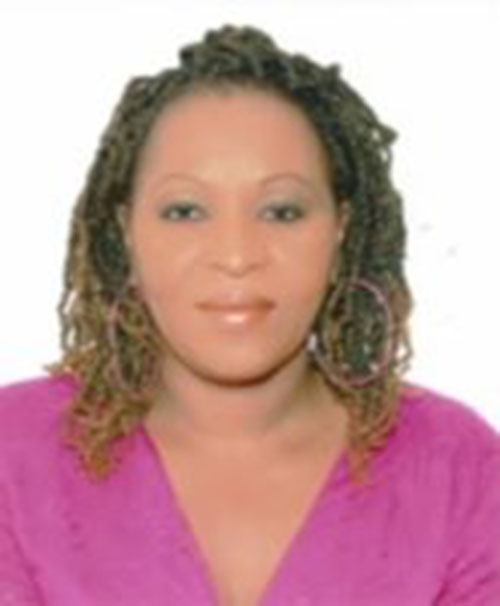Academics Professor Cynthia Barrow-Giles and Dr Ronnie Yearwood see the resort to the courts to resolve political grievances stemming from last year’s elections impasse here as being representative of a trend towards the “judicialization of politics” in the Commonwealth Carib-bean.
“The courts [are] getting more and more involved in politics,” Barrow-Giles said on Thursday evening, while singling out Guyana specifically, but also making reference to a few other Caribbean territories.
Barrow-Giles, a political scientist who led the team that observed the recount of votes here last year, was at the time making a presentation on a research paper she has authored with Dr. Yearwood, an attorney and law lecturer, on “the Judiciary and the 2020 Guyana Elections.”

During the presentation at a virtual forum facilitated by the University of the West Indies (UWI), Cave Hill Campus, Barrow-Giles said that Guyana lacks political maturity, which according to her is associated with the project of nation-building, and she also took aim at some rulings by the local Appeal Court, which she described as “questionable.”
She also said that Guyana should also rethink the way in which the Guyana Elections Commission (GECOM) is presently constituted as she argued that it “has not served Guyana well at all,” and likened it to being a “party-partisan organization.”
According to Barrow-Giles, the elections specifically signal “the saliency and increasing importance of the judiciary in Guyanese politics.”
Notwithstanding the right any political party has to approach the courts for redress if they so desire, Barrow-Giles’ view is that political parties went to court to resolve political issues that should have been settled out of court.
According to her, “the political parties deliberately resorted to the courts in order to resolve what was essentially in our view a political issue.”
That issue, she said, was “who was the winner of the elections.”
Barrow-Giles said that given its clear legal, political and constitutional significance, it is GECOM which should have had an “overriding role to play in the developments that took place” following the March 2nd polls.
It is her view, however, that “unfortunately,” for a number of reasons, GECOM was “sidelined.” According to her, one reason the Commission was snubbed is because the Constitution of Guyana, unlike most other constitutions and election law “has in fact given to GECOM tremendous powers—powers that typically you did not see associated with other election bodies.”
Yet, she said, GECOM was unable to use its power to assert itself. This, she said, is a clear example of the use by “all the political parties, not just the dominant political parties…to try to access the decision-making power of the courts over matters which in our view have traditionally been resolved by political actors.”
She described the March 2020 elections as being “globally one of the most delayed elections in terms of declaring the winner.” Part of that she said has to do with a “failure of the parties to accept a defeat and of course for a winner to be declared.”
Referencing the successful passage of the December 2018 No-Confidence Motion (NCM) by which the David Granger-led APNU+AFC Coalition government fell and which occupied the court’s attention for almost a year, Barrow-Giles noted the fact that the elections should have taken place long before it actually did.
In that same vein, she noted that it was not until August 2nd that GECOM was finally able to declare a winner of the March 2nd elections
Politics of ethnicity
She then moved on to discuss what she said was the “politics of ethnicity” in Guyana, which she said “has traditionally been characterized as a multi-ethnic society.” Against this background, she said that multiculturalism and multi-ethnicity of Guyana’s plural society is critical in terms of what occurred following the elections of March 2020.
Barrow-Giles said that the world saw “extremely astonishing developments” which occurred before and after the elections.” According to her, Guyana is a very bipolar ethnic state in which they are very acute differences along ethnic lines which “unfortunately have led to what we describe as seemingly incompatible political claims.”
She said that ethnicity has been a major issue in “all” of the elections in Guyana and that in terms of election outcomes and voting, persons in Guyana vote traditionally along ethnic lines.
One of the “undesirable consequences” of a bipolar ethnic State such as Guyana, she said, is the desire of winning the election “at any cost.” She said that people perceive the winning political party as ‘not producing policies that would in fact prioritize the needs of the group that has in fact failed to win the election.”
The result, she said, is then “unfortunately too often” that people regard the winning political party and the government and the policy-making process as illegitimate, which adds urgency “to the desire to win the election at any cost.”
Meanwhile, to their focus on the judicialization of politics, Dr. Yearwood said that the “perception for a long time” has been that electoral administration belongs to the domain of politics and that such matters have historically been treated as “political questions that don’t necessarily lend themselves to easy judicial supervision or easy judicial adjudication.”
He said that the concept also involves—not necessarily the courts themselves getting involved actively in resolving political issues—but rather social actors using the courts to advance their particular interest.
This happens, he said, because political and social actors begin to get attuned to court actions so that State legitimacy “is constructed increasingly in terms of law and Rule of Law,” so that there is a move from politics to the law.
Really, he said, however, the courts are “being used to deliver political decisions or what essentially should be political decisions.”
He noted, however, that judicialization can also connote the meaning of courts “carving out” space for democratic institutions. This particular judicialization he said, does not take on a “negative spin,” since, in the case where it is an early developing State, the Courts are required to help craft space for democratic institutions to thrive.
This he said is different from judicial activism, on the other hand, which can signal a “court’s overstepping into the political arena.”
Space
In the case of Guyana, Yearwood said that the concept of judicialization is best understood when applied specifically to a particular polity or space.
Barrow-Giles and Yearwood they found that judicialization here “is about active political actors using and fighting political battles through the courts.”
This, according to Yearwood, means that the courts here will require more “circumspection in how they are drawn into the political battles and how they resolve these battles.”
According to Yearwood, who was a political science student of Barrow-Giles, what the political actors will begin doing is account for what happens when they approach the courts, so that they make the courts an integral part of their political strategy if they are attempting to affect the outcome of an election before or even after the votes have been cast.
According to Barrow-Giles, the last “convincingly” won elections in Guyana was by the PPP/C in 2006. Since then according to her, “all the elections” have shown slim victories.
Noting what she said was the refusal by the APNU+AFC to accept defeat and that its government had fallen after the passage of the NCM and all the number of other legal challenges mounted therefrom, Barrow-Giles said this illustrated the concept of judicialization.
She said that given all that has been revealed since March 2nd, 2020 is that there “clearly was some malfeasance taking place on election night.”
Referencing the reports of all the local and international observer missions that the actual casting of ballots had been a free and fair exercise, issues, she said, emerged only at the count and tabulation of ballots.
According to her, “what is clearly indicated” is that the process at that point became very “compromised” as there were procedural violations for the tabulation in electoral District Dour.
Noting that the district, the largest, was critical for both major political parties—the APNU+AFC and the PPP/C—Barrow-Giles said that from the observer reports, apparently in the tabulation process by the Returning Officer for the district “…it appeared that the process was not credible, transparent, and inclusive.”
This, she said, created “problems in the country,” and marked the beginning of what would be a host of legal challenges being mounted by both political parties.
Regarding those matters and what she described as the ‘court’s involvement” therein, Yearwood said that regarding judicialization and politics in the Caribbean, but Guyana specifically, its 2020 elections were significant in signaling the predominance “of the judiciary at the invitation of political parties.”
He said that the sheer volume of litigation originating in the local courts regarding the elections and the national recount of ballots, going all the way to the Trinidad-based CCJ, Guyana’s court of last resort, demonstrated a pattern between law and politics.
The pattern, he said, is that political parties make political agreements, only for them later to land themselves in court for final settlements on a legal basis.
On this point he said that “the courts were being used to move issues from the political to the legal space,” whether directly or indirectly, for policymaking “or more specifically for political battles.”
He said that there is a thin line between ensuring procedural fairness grounded in law which the political parties were seemingly seeking, “and the courts then becoming arbitrators in an election.”
Yearwood said that the CCJ, being “sensitive” and “astute” regarding the issue of judicialization, shied away when it could from making political determinations intended by Parliament to be made by politicians, in the matters brought by Guyana from the passage of the NCM right up until the results of the March 2nd polls were finally declared five months later.
He said that CCJ took a restrictive role in those instances, in deference to the separation of powers doctrine.
Responding to a question posed, Barrow-Giles said that some “of the judgments which have been made” by the local courts which she described as “questionable,” need to be looked at. Against this background, she said that one of the most important questions is whether or not the courts in Guyana “are truly as independent as they really ought to be and therefore what can be done about that.”
She also questioned whether the judgments are a reflection of what she called the “lack of independence of the courts” here in Guyana.
Yearwood would then go on to suggest that the resort by political parties to the courts may also amount to an “abuse of process,” by which they enjoin the courts into the political arena and though according to him “many of the judges” are trying to shy away from this, they are nonetheless allowing claims.
Responding to observations from other participants, Yearwood said that while the rulings of the local High Court and acting Chief Justice Roxane George were often in sync and upheld by the CCJ, the same could not be said for the Guyana Court of Appeal, with the CCJ often having to overrule the appeal court and affirm the High Court rulings.
According to Barrow-Giles, “some of the judgments that came out of the Court of Appeal are highly questionable.”
On this ground she said that there is need to “examine the appointment process of the individual (judge(s)).” She said that while she does not want to impugn “anybody’s character or reputation,” there were “certainly some questionable judgments.”
She said that there “might be a connection…with the appointment process and some of the judgments,” while stating that in the Region there needs to be a complete separation of powers among the various arms of government.






